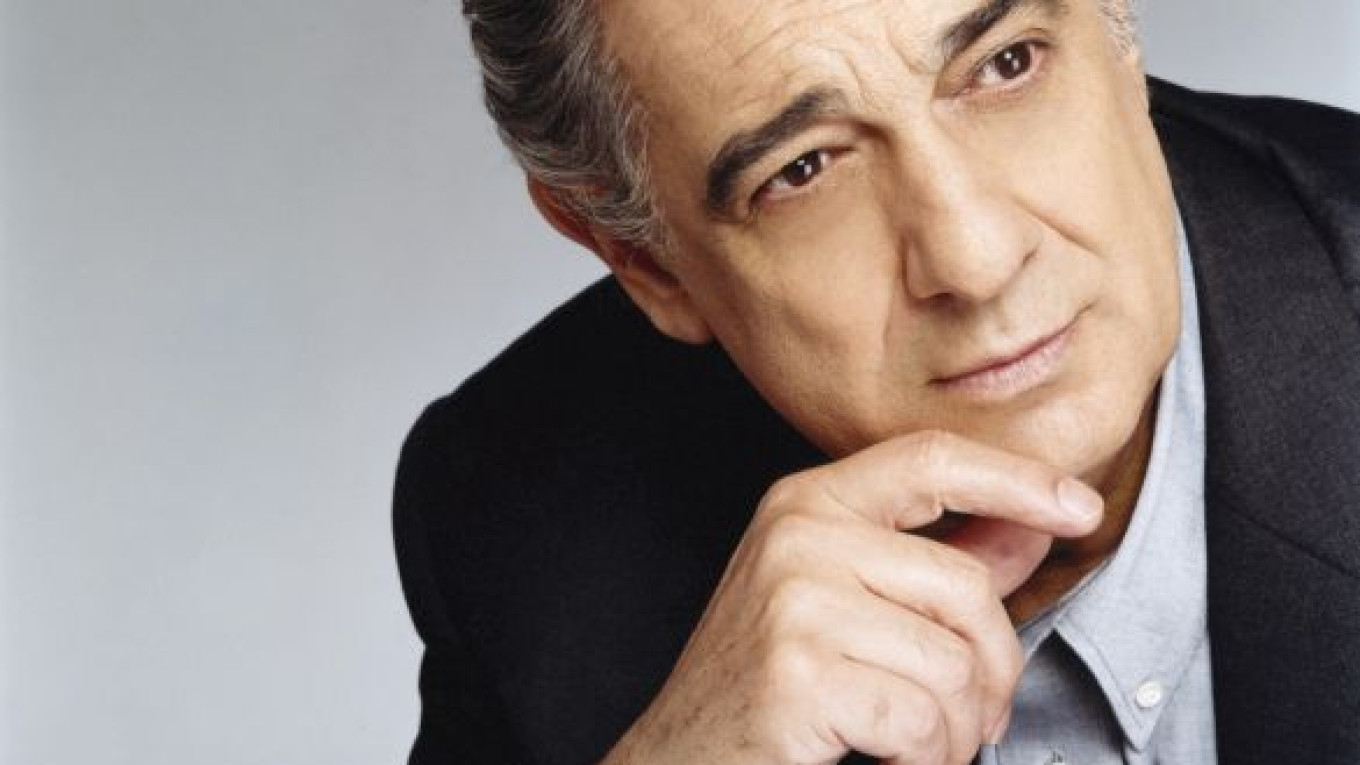World-renowned tenor Placido Domingo came to Moscow in mid-July, bringing with him Operalia, an annual competition for young opera singers that he founded in 1993 and has been the driving force behind ever since.
Operalia moves each year to a different city. Considering that last year’s competition took place at Milan’s prestigious Teatro alla Scala, the Bolshoi Theater might logically have been chosen as its Moscow venue. Instead, the Stanislavsky and Nemirovich-Danchenko Musical Theater played host, no doubt in large measure due to the presence on the jury of the great Russian soprano Galina Vishnevskaya, who five years ago, in an angry reaction to the Bolshoi’s radical restaging of Pyotr Tchaikovsky’s opera “Eugene Onegin,” swore never again to set foot in the theater. Vishnevskaya’s Moscow-based Opera Center served as the competition’s co-organizer.
Forty-one singers, drawn from 24 different countries, took part in Operalia. And at the end of the third and final round, prizes were awarded to participants from Chile, Moldova, Russia, South Africa, South Korea and the United States.
Taking place just two weeks after the close of the Tchaikovsky Competition, Operalia obviously begged comparison to the Tchaikovsky Competitions’s vocal contest. And without much doubt Operalia emerged the winner. Not only did Operalia attract a much more geographically diverse group of contestants — the 40 of the Tchaikovsky Competition came from just 10 countries, 22 of them from Russia alone — but the overall level of talent on display seemed notably superior.
It could also be argued that Operalia made a wiser choice of jury members. While the Tchaikovsky filled its jury entirely with past and present opera stars, Operalia’s jury consisted for the most part of directors and administrators of major opera houses, the very people on whom singers most depend to further their careers.
Certainly, another factor in Operalia’s favor was the genial presence throughout of Domingo, who not only acted as chairman of the jury, but led Stanislavsky and Nemirovich’s orchestra in sensitive accompaniments to the arias of the 13 final-round contestants.
Five Tchaikovsky Competition participants took part in Operalia and three of them ended up with awards, Russia coloratura soprano Olga Pudova, rather mysteriously excluded from the Tchaikovsky’s final round, receiving third prize among the women, Russian baritone Konstantin Shushakov, who failed to progress beyond the first round of the Tchaikovsky, taking second prize for men, and the Tchaikovsky male first-prize winner, Korean bass Jongmin Park, treated rather surprisingly to a $15,000 special prize for his interpretation of music by Richard Wagner and Richard Strauss. Though Park sang nothing by either composer, his strong, resonant voice led the jury to conclude that he might someday become a Wagnerian bass of consequence.
Operalia’s $30,000 first prizes went to South African soprano Pretty Yende, who drew a well-deserved ovation from the audience for her beautifully shaped final-round rendition of an aria from Italian bel canto composer Vincenzo Bellini’s rarely heard “Beatrice di Tenda,” and to American Rene Barbera, whose clear, unforced lyric tenor voice and impassioned interpretations marked him as a likely prize winner through all three competition rounds.
Taking a second prize of $20,000, in addition to Shushakov, was Moldovan lyric soprano Olga Busuioc, who particularly distinguished herself in the final round with a glowing account of Tatyana’s Letter Scene from “Eugene Onegin” and would probably have been my own choice for first prize. Shushakov, an alumnus of the Bolshoi’s Young Artist Program, displayed a smooth and quite powerful voice of just the sort that might someday bring him to the forefront among interpreters of the great baritone roles in the operas of Giuseppe Verdi.
Pudova, a member of the Mariinsky Theater’s Academy of Young Singers, sounded edgy in the first two rounds, but came into her own with a stunning third-round performance of the Queen of the Night’s second-act aria from Wolfgang Amadeus Mozart’s “The Magic Flute.” Also receiving a third prize of $10,000 was Jaesig Lee, a well-schooled lyric tenor from South Korea.
Operalia’s contestants were given the option of competing for prizes for interpreting the Spanish operetta-like genre known as zarzuela, in which both of Domingo’s parents were notably active. More than half of the contestants rose to the challenge, with Yende, Busuioc and Barbera adding $10,000 to their prize money by coming out on top. A special prize of $10,000 was awarded to Chilean baritone Javier Arrey.
While the jury deliberated following the third round, the audience was given an opportunity to vote for its favorites. And unlike the case at many competitions, the audience and jury ended up in total agreement, with audience members giving the nod to Yende and Barbera. The reward was a watch to each of them from Operalia sponsor Rolex.
A Message from The Moscow Times:
Dear readers,
We are facing unprecedented challenges. Russia's Prosecutor General's Office has designated The Moscow Times as an "undesirable" organization, criminalizing our work and putting our staff at risk of prosecution. This follows our earlier unjust labeling as a "foreign agent."
These actions are direct attempts to silence independent journalism in Russia. The authorities claim our work "discredits the decisions of the Russian leadership." We see things differently: we strive to provide accurate, unbiased reporting on Russia.
We, the journalists of The Moscow Times, refuse to be silenced. But to continue our work, we need your help.
Your support, no matter how small, makes a world of difference. If you can, please support us monthly starting from just $2. It's quick to set up, and every contribution makes a significant impact.
By supporting The Moscow Times, you're defending open, independent journalism in the face of repression. Thank you for standing with us.
Remind me later.


